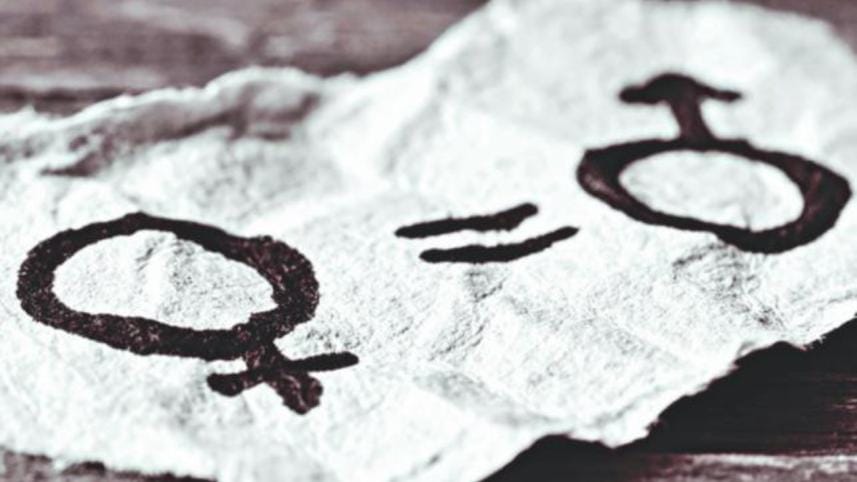Changing the narrative of rape

In recent months, the national media has consistently drawn our attention to a crime that scourge our society: rape against women and children. We are aware that in 2018 alone, 496 rape cases against children were counted (BSAF data on Child Rights Violation 2018). On average, nearly 13 women and girls were raped in Bangladesh every day in the first four months of 2019.
We do also know that the number of rapes is much higher than what is actually reported.
While we welcome the fact that these crimes are widely condemned, we also recognise that they are hardly framed as a systemic form of women and children's rights violations. We rarely reflect on the reasons why, as of today, one out of three women still suffer violence in the world, and why the situation seems to be getting worse in some parts of the world. We do not talk enough about how rape is pervasive and normalised by a sexist and unequal society that values women less and does not put enough attention to women and girls' rights and safety; how patriarchy systematically drives rape and other forms of violence against women; how male dominance, entitlement and eagerness of reinforcing their power is what is at the base of a "culture of rape".
The word "rape" derives from the Latin rapere, meaning "to steal, seize, or carry away." Accordingly, early laws against rape conceptualised the crime as an offence against a man, be it the husband or father, whose "property" has been violated. It took years for the law to be amended to focus on the real victim, the woman, and yet globally we are very far from providing an adequate and survivor-centred legal protection system. Today, in many countries, a rapist can go free by simply marrying the victim.
When we look at the Bangladesh legal system, rape is framed in the context of morality, honour and modesty of a woman. Furthermore, survivors often face bias and discrimination in the justice system. For example, in the current legal system, the Evidence Act makes admissible in court the consideration of the character of the victim, specifically her immorality, thereby reinforcing rigid gender norms that blame and humiliate women, and also lead to impunity. The treatment of female survivors in the justice system reflects general societal views, where a 2011 UN study found that 54 percent of rural men and 45 percent of urban men believe that a woman had to be blamed for putting herself in that situation. And even when survivors do report the crime, the conviction rate in cases filed under the provisions of the Women and Children Repression Prevention Act 2000, is extremely worrying: only 0.3 percent in 2018.
As a result, we should not be surprised that only 2.6 percent of women took any legal action for partner physical or sexual violence.
As UN Women, we believe it is our duty to stress that rape involves and concerns the society as a whole, not simply the perpetrator and the survivor. It is our mandate to promote positive gender social norms and a more just and equal society. To do that, it is critical to inspire change by questioning our internal beliefs and misconceptions on the role and position of women and men in society.
Patriarchy and social norms have programmed women to be passive, to be polite, quiet and accommodating towards male violence and discrimination. This is also among the reasons why rape is widely unreported. There is a general stigma and shame attached to it, and often daughters are convinced by their family to stay silent to avoid bringing shame to the family. Sometimes they try to report, like in the case of Nusrat, but they are not believed and rather humiliated, harassed and tragically killed.
What we need to stress is that rape is as much a crime as an expression of male's entitlement in a patriarchal and misogynistic society. The 2011 UN study shows that in Bangladesh, the most common motivation for sexual violence was the belief that sex is a man's entitlement (77 percent of urban and 81 percent of rural men). About 29-35 percent of men surveyed sexually abused women to take out their anger or to punish them, showing how rape is not always a matter of sex but rather of power.
Our position is that we cannot fight rape through criminal punishment alone. We need to go deeper and frame rape within male entitlement and gender inequality, and as such, recognise and internalise that we cannot stop rape if we do not dismantle patriarchy, reconstruct notions of masculinity and break gender stereotypes.
As such, we would like to call upon women and men to take a stand against the culture of rape and promote more gender equal roles. Parents can teach children about consent and the true meaning of it. We can challenge the conventional definition of masculinity, by contesting the notion that sexual harassment and assault is simply caused by "boys being boys". Gender equality should be promoted in schools together with sex and sexuality education. Critical is to resist victim blaming and work together to amend the current legislation that is still discriminatory towards women. We all have a role to play, by avoiding being bystanders and calling out sexist jokes or language that perpetuates a rape culture and by creating a safer environment for women and men.
Shoko Ishikawa is the Country Representative of UN Women in Bangladesh.
 For all latest news, follow The Daily Star's Google News channel.
For all latest news, follow The Daily Star's Google News channel.
Comments